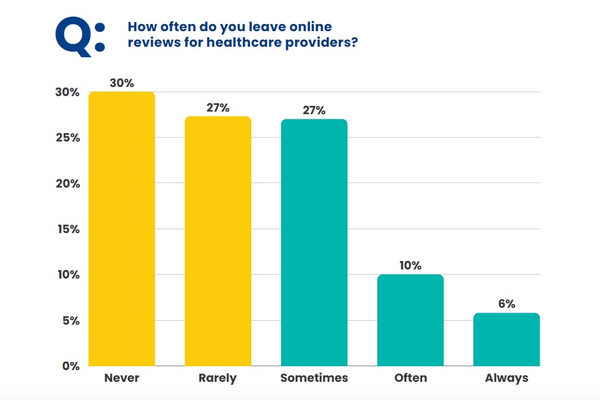
Consumers looking for a doctor are relying more on online reviews over
recommendations from friends and family, according to a report from rater8, a healthcare reputation management firm.
In a survey of more than 1,000 people, 84% said they check online reviews
from platforms like WebMD, Healthgrades, Vitals and Google before choosing a new healthcare provider (HCP), with 51% reading at least six reviews for that HCP.
Nearly two-thirds of respondents
(61%) place so much stock in those reviews that receiving personal recommendations for an HCP would not necessarily overcome negative online reviews, rater8 reports.
Whether they
do or not would “depend on the situation,” according to 47.4%. Yet only 13.5% said online reviews would always carry more weight vs. 39.1% always relying on personal recommendations.
And while online reviews are deemed so important, more than half of respondents (57%) said they rarely or never leave their own HCP reviews.
advertisement
advertisement
“We struggled for years to effectively
encourage our patients to leave feedback about their experiences,” says JC Sandel, director of marketing for Urology Centers of Alabama, in the report. “Unfortunately, most of our reviews
were from the very few who left our practices dissatisfied.”
Titled “How Patients Choose Their Doctors,” the report notes that “unsatisfied patients are significantly
more likely to leave a 1-star review following a disappointing experience, whereas satisfied patients are less likely to leave reviews unprompted….Happy patients tell their friends, and unhappy
patients tell the world.”
The report provides some tips to alleviate that problem, based on survey results.
Most importantly, providers should ask patients to write a
review: “74% of patients are at least somewhat likely to leave a review when prompted by their provider.”
But HCOPs should ask them via email or text message, rather than by
personal request or QR code: 45.7% of respondents said they prefer emails, and 29.2%, texts.
And they should do it quickly: “Asking patients for a review immediately after a visit can
make a huge difference in the likelihood of the request being completed—47% noted that they are most likely to provide a review within a day of their appointment.”
“We’ve found that physicians and practices being actively involved in soliciting, managing, and engaging with reviews makes a difference,” Evan Steele, founder and CEO of rater8,
said in a statement.
But, “driving patients to leave online reviews is just the beginning,” Steele explained. HCPs also need to respond to both negative and positive reviews, he
said. “Providers who are not actively engaging with the reviews they receive are missing an enormous opportunity in the continued evolution of patient expectations and care.”

Almost half of study respondents (45%) noted that, when choosing a
provider, they are swayed by whether doctors respond to online reviews, either negative or positive ones. And 41% said their trust in a provider increases when they see such responses.
“If you’re continuously adding new reviews and responding to those reviews, you get more traction with the algorithms of the search engines,” Denise Harshbarger, director of
marketing at nationwide podiatry provider Balance Health, says in the report. “You’re pushed higher, and that means more leads coming in, more clicks and more calls.”
“Patients have high standards for care,” Steele noted, “and they have no qualms about changing providers when their needs aren’t met.”
Indeed, 40% of study
respondents noted that bad reviews “have even caused them to stop a care plan in its tracks and change course (canceling an appointment they made or not booking with a provider they planned to
see).”
Patients deemed primary care providers the easiest to change if they were unhappy (noted by 64%) compared with specialist doctors like dermatologists (32%) or ophthalmologists
(22%).
To increase the likelihood of positive reviews, the report also recommends creating an “exceptional in-office experience” through such factors as “shorter wait times,
friendly staff, and clear communication about care plans.”
The survey was conducted in December via SurveyMonkey, with more than a quarter of respondents(26%) saying they
are considering changing HCPs in 2025.